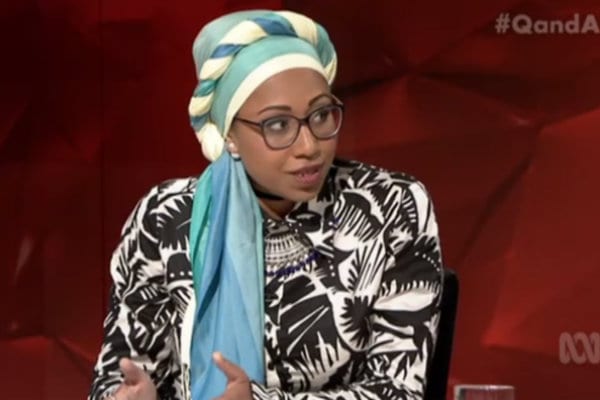It is the most glaring irony in the commentary and abuse being levelled at the 26 year old Sudanese-Australian engineer following her appearance on ABC’s Q&A last Monday night. But it’s not the only one.
Parts of the press which have lobbied for the disbandment of Section 18C of the Racial Discrimination Act because of the threat it poses to freedom of speech, have led the charge against Abdel-Magied.
It seems that her freedom of expression ought to be curtailed.
Her detractors want the ABC to sack her. They want her platform cut down. They want her voice silenced.
A book tour she undertook throughout the middle east last year, under the auspices of DFAT, was splashed across The Australian newspaper. How dare this young woman be given this platform? How dare she visit countries that oppress women?
The places Yassmin Abdel-Magied visited and how women are treated there https://t.co/NZbTM1eAde
— The Australian (@australian) February 16, 2017
Never mind the fact that heads of state, diplomats and politicians frequently visit countries which oppress women, without those individuals being held responsible.
Never mind the fact that many of the cheerleaders condemning Yassmin for her purported support of the oppression of women, have contributed not an iota of energy or action to the liberation of women. Anywhere. Ever.
Never mind the fact Yassmin was named the Young Australian of the Year for Queensland in 2015. Or graduated from her Bachelor of Mechanical Engineering with first class honours. Or that she helped found Youth without Borders at age 16. Or the work she does to attract young women to careers in science, technology, engineering and maths.
Never mind that she volunteers her time to various boards, advisory committees, NGOs and businesses. That she has achieved more in her 26 years as an engaged, educated and eminently qualified citizen who promotes tolerance, understanding and cultural awareness than most of us will in a lifetime.
This has mattered little in the public battle Abdel-Magied has been caught in since her clash with Senator Jacquie Lambie on Q&A last week. In this battle she has been cast as the protagonist who needs to be stopped. The embodiment of Islamic oppression – despite her position as an evidently liberated Australian woman.
Her “Australian-ness” has been questioned, her faith derided and her work pilloried: all because she has the audacity to speak up.
“People talk about Islam without knowing anything about it, and they’re willing to negate any of my rights as a human being, as a woman, as a person with agency, simply because they have an ‘idea’ of what my faith is about,” Abdel-Magied told Lambie.
“Islam to me is the most feminist religion: we got equal rights well before the Europeans. We don’t take our husbands’ last names because we aren’t their property. We were given the right to own land… The fact is, in Sharia it says you follow the law of the land you are on.”
There is no point ignoring the reality that Sharia law is used to oppress women in parts of the world. That is true. But there is also no point in ignoring the truth in Yassmin’s comments or the context in which they were made.
She was on live television and had just had her identity, humanity and her faith openly criticised, in a week where her identify, humanity and faith had been more publicly criticised due to the unprecedented “muslim ban” initiated by the US President Trump.
Yassmin was being confronted by someone who misunderstood her and misrepresented her religion – during a time where misunderstanding and misrepresentation of her religion has become the norm.
She responded in a way most of us would: with passion, conviction and fear. But I suspect most of us would struggle to remain as composed and articulate as she did.
There is no question the subject matter of Islam and feminism is complex. But there is also no question that the treatment of Abdel-Magied in this discussion has gone well beyond fair comment.
As Julie McKay, the Gender Advisor to the Chief of the Defence Force and Partner PwC wrote:
“We need to be more honest about what is going on here — the targeted undermining of a young woman who breaks every stereotype, is challenging us all to think differently and who from time to time, calls out our ignorance.”
The treatment of @yassmin_a this past week – particularly in some parts of the press – has gone beyond fair comment to vitriolic vendetta.
— Jamila Rizvi (@JamilaRizvi) February 20, 2017
Abdel-Magied herself reached out to others for advice on how she could have better handled the exchange. She took to Junkee to film another explanation of Sharia Law that has been viewed more than 5 million times.
https://www.facebook.com/junkeedotcom/videos/1168597126586083/
As Ruby Hamad wrote for Fairfax it is not enough to counter fear of ‘Sharia law’ by insisting Islam is ‘feminist’.
“What progress can we hope to make when it is clear that “Sharia law” means something completely different to Muslims and to non-Muslims?
It is clear to me that when Lambie talks of “Sharia law” she is referring to the regressive dogma enforced in the criminal codes of some Muslim-majority countries, while to liberal Muslims like Abdel-Magied, Sharia is about private, personal ethics.
It shouldn’t be that difficult to make a distinction between the two and it could be as simple as qualifying the difference between criminal Sharia law, or hudud, and the private moral code.”
That distinction shouldn’t be too difficult to make. And yet, it seems, making that distinction is beyond too many of us.
Which is why Yassmin has become a lightning rod for abuse over the past week – on the basis of her gender, her faith, her work and her decision to put her head above the parapet. It’s galling that much of it has been framed around the danger in her purported promotion of oppression.
https://www.facebook.com/senator.sam.dastyari/photos/pb.269334213215074.-2207520000.1487650685./741768192638338/?type=3&theater
You don’t have to look to the Middle East to find women being put in their place. There’s plenty of that happening right here.


